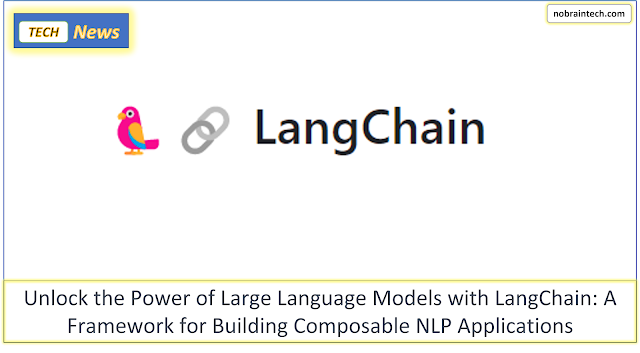Large language models (LLMs) are a powerful new technology that can be used to build a wide variety of applications. However, LLMs are also complex and can be difficult to use. LangChain is a framework that makes it easier to build applications with LLMs by providing a composable interface.
LangChain is a Python library that aims to help developers create powerful applications using large language models (LLMs) and other sources of computation or knowledge. LLMs are neural networks that can generate natural language texts based on a given input, such as a prompt, a question, or a context. LLMs have shown impressive capabilities in various natural language processing (NLP) tasks, such as text summarization, question answering, text generation, and more. However, using LLMs alone is often not enough to achieve the desired results, especially when the task requires specific data or logic that is not available in the LLM's pre-trained parameters. This is where LangChain comes in.
LangChain provides a framework for building applications that combine LLMs with other tools and services, such as databases, APIs, web scrapers, and more. LangChain allows developers to create chains of calls that can interact with different sources of information and computation, and use them to augment the LLM's generation process. For example, one can use LangChain to create a question answering system that can query a specific document or database before generating an answer, or a chatbot that can access external APIs to provide relevant information or actions to the user.
LangChain provides a generic interface to a variety of different LLMs. This means that you can use any LLM that LangChain supports, without having to worry about the specific implementation details. LangChain also provides a framework for managing prompts. Prompts are used to guide the LLM's output, and LangChain makes it easy to create and manage prompts.
LangChain also provides a set of utilities and integrations that make working with LLMs easier and more efficient. These include prompt management, prompt optimization, generic interface for all LLMs, memory management, agent-based modeling, and more. LangChain supports various LLMs, such as GPT-3, GPT-Neo, GPT-J, and BART. LangChain also integrates with popular tools and services, such as Notion,
Wolfram Alpha, Zapier, and more.
In addition to providing a generic interface and a framework for managing prompts, LangChain also provides a number of other features that make it easier to build applications with LLMs. These features include:
A central interface to long-term memory: This allows you to store information in the LLM's memory, which can be used to improve the performance of your application.
External data: LangChain can access external data, such as text files, databases, and APIs. This allows you to combine the power of LLMs with the power of other data sources.
Agents: LangChain can also interact with other agents, such as web servers and databases. This allows you to build applications that integrate with other systems.
LangChain is a powerful framework that makes it easier to build applications with LLMs. If you are interested in building applications with LLMs, I encourage you to check out LangChain here at -
https://github.com/hwchase17/langchain/
Here are some examples of applications that can be built with LangChain:
Question answering: LangChain can be used to build question answering applications. For example, you could build an application that answers questions about a specific topic, such as history or science.
Text generation: LangChain can be used to generate text, such as news articles, blog posts, and creative writing.
Translation: LangChain can be used to translate text from one language to another.
Code generation: LangChain can be used to generate code, such as Python scripts or Java classes.
Data analysis: LangChain can be used to analyze data, such as financial data or social media data.
Agents: Two main types of agents are available: Action Agents which take one step at a time and Plan-and-Execute Agents which first decide a plan of actions to take, and then execute those actions one at a time.
These are just a few examples of the many applications that can be built with LangChain. If you have an idea for an application that uses LLMs, I encourage you to check out LangChain by following its documentation here at -
https://python.langchain.com/en/latest/
LangChain is designed to help developers create applications that leverage the power of LLMs and composability. By using LangChain, developers can build applications that are more intelligent, flexible, and scalable than ever before.











No comments: